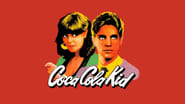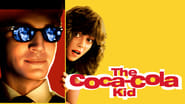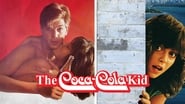SnoopyStyle
Becker (Eric Roberts) is an eccentric self-possessed sales trouble-shooter sent to Australia from the Coca-Cola headquarters in Atlanta. Terri (Greta Scacchi) is assigned to be his secretary. DMZ is her daughter. He finds one specific area where there is no Coke being sold. It's Anderson valley where Terri comes from. The valley is run by the proud McDowell who makes and sells his own soft drink. He has a history with a Coke advertising girl and together they have a daughter. Becker is looking for the Australian sound.Eric Roberts is terrific. He has a magical moment with a glass of Coke. I'm always surprised at the film's declaration that they have no connection to Coke. His presentation is like a Mamet speech about the love of Coke. Greta Scacchi is funny and super sexy as a Coca Cola Santa. The problem is that the story isn't much in between the fun scenes. Some of the music is catchy and the movie is a bit of fun.
wayfarer4
This is a marginal movie, easily forgettable among a large string of low budget movies trying to cash in on the early American interest in Australia in the mid-1980's. If it has a true failing, it is in being considered a comedy, which I feel it isn't. It is closer to a drama, a story of a supremely confident man being thrust into a world he has no real understanding of.The acting is actually quite good, and the odd little twists that his journey takes are truly enjoyable, but it gets bogged down in clashes of dueling pride, of a lack of even the most minimal attempts to understand the Australian culture, and a penchant for using nudity to move the movie along. There are numerous questionable characters, people that seem to be in the movie simply to provide a momentary diversion from a real plot. It does manage to steer around several bits of stereotyping, such as presenting an Aborigine musician who never flinches at being patronized, even flippantly handing over a business card advertising his services.The visuals are wonderful, including one of the most spectacular sunrise shots across the Outback. The movie does a wonderful job of showing bits of the mixture that Australia is, including a roving patrolman riding a camel, and trying to address the great question - "What is the pure Australian experience?". If they had found a way to fill the movie with more of these moments, it might have been far better.I'd recommend this movie for one of those nights when nothing else seems right. It's a decent time passer, but shouldn't be taken too seriously.
Pepper Anne
I started watching The Coca-Cola Kid with the assumption that it would be like other Australian comedies I have seen in which a gung-ho businessman of some sort wants to change a rather dogmatic, traditional industrialist like 'Spotswood' or, in reference to homeowners, 'The Castle.' And true, that is the initial plot in 'The Coca-Cola Kid.' Eric Roberts plays an efficient Southern businessman who plays a key role for the Australian marketing department for the Australian headquarters for the Coca-Cola Company. While trying to assess the markets and potential successful marketing ploys, he learns that there is a large portion of a rural section of Australia that has no Coca-Cola distribution whatsoever and he wants to know why. Enter lovable and genuine old-timer, T. George McDowell, who has his own successful and self-sufficient coke company which monopolizes the area. It is the last of its kind and Becker, who cannot simply fathom any section of the world that has no option of Coca-Cola beverages (he even goes so far to say that freedom cannot be established without global presence of Coca-Cola) intends to compete with McDowell. But, McDowell, used to the frequent visits from Coca-Cola marketing executives who try to make deals (and offer to buy him out?), figures that Becker is another lightweight (at least, initially) and is not ready to give in without a fight. This is essentially the crux of the story, the global company versus the independent.But, the movie takes both an odd and confusing turn at about the time that Becker tries to rain on Mr. McDowell's parade when he shows up at the Rotary Dance with Santa's offering the audience free samples of Coca-Cola. Because, this is about the same time that the story shifts it focus from the main plot to the subplot involving Becker and his eccentric former secretary (played by Gretta Scacchi). Although, I can understand that this is no less essential to the story because Becker, in his involvement with the secretary, is finally pulled from his impersonal role as marketing executive and forced to eventually take on a more humanistic role. But getting there was so weird, and this is especially evident from the sequences where Becker gets drunk and shows up at the drag queen club. And, it is probably Becker's exceedingly weird emptiness that creates such an odd atmosphere and, at least for me, some of the confusion. I don't know if this is how we are supposed to view Becker, or if Eric Robert's strange performance just leads to this. Nonetheless, after slagging through this rather strange and abrupt shift in mood and, eventually, focus, the rest of the film pulls through rather nicely with a somewhat humorous (especially the events involving the hotel bellhop who is convinced that Becker is in the CIA) and ultimately sad ending that makes Becker rethink his situation. The filmmakers offer both a mix of the happy ending and not-so-happy ending (you have to watch it to see what I mean). A pleasant, but unusual Aussie comedy/drama that may be worth your time if you can find it. Just don't go into it with the expectations that it is yet another steadily simple narrative or a typical feel-good Australian comedy.
d_fienberg
The opening titles for The Coca-Cola Kid make it clear that the film is in no way sponsored by Coca-Cola or the Coca-Cola bottling company. Obviously the company felt comfortable enough with the final product to let the film use their name, but it's hardly a glowing picture of the soft drink giant. In The Coca-Cola Kid, Coca-Cola is the face of American Imperialism. When company trouble shooter Becker (Eric Roberts) declares, "The world will not be truly free until Coke is available everywhere," he's speaking without irony. This film, then, is about Becker's attempts to help Coca-Cola colonize Australia, but what starts off as a film of comic promise and originality becomes bogged down in convention and cliché to the point that it's difficult by the final reel to remember what was so appealing at the beginning.The Coca-Cola Kid fits nicely in the genre of American Corporate Fish Out Of Water tales. If you've seen the delightful Local Hero, for example, you'll know that no matter what kind of tough American goes off to the rural wasteland, he'll change, enlightened by the small town quirks and wisdom he was meant to subvert. That's not really giving anything away in this film, because the last act doesn't play out as you expect. In fact, it hardly plays out at all.Becker arrives in Australia to help boost lagging sales. It turns out that there's a whole region of the country where no Coke is sold at all. Becker, a former marine with the proverbial "unorthodox way of doing business," discovers that that region is ruled over by T. George McDowell (Bill Kerr) a gruff man of homespun wisdom, but more importantly, homemade soft drinks, made from real fruit. Even though their first encounter is rough, Becker is determined to fight off the advances of his secretary-with-a-secret (Greta Scacchi) and the hotel waiter who mistakes him for an arms dealer to do the job he was sent to do.Directed by Dusan Makavejev, The Coca-Cola Kid develops a wonderful momentum early on. In fact, the first hour of the film is an absolute gem. Eric Roberts's performance to that point is perfect. His presentation to the bemused Coke officials is comic gold, as he waxes poetic about the fizzy beverage, even holding it up to the light bathing the room in its brown glow. Roberts's early scenes with Scacchi have a nice screwball touch and his interactions with Scacchi's moppet daughter provide a nice depth for the character, hinting at something beyond his intensity. There's a nifty sequence where Becker enlists a studio band to try to come up with the "sound of Australia" where they go through several absurd suggestions before coming up with a truly catchy jingle.I'm not sure how far it is into the movie, but for me things begin to go south immediately after that recording session. For reasons completely unclear to me, the secretary has Becker invited to a party to catch him in an awkward position. This involves completely random intimations of homosexuality and ends of feeling both forced and pointless. The scene is so clumsy that it leaves a bad taste that begins to spread.It rapidly becomes clear that The Coca-Cola Kid isn't going to omit a single convention of Australian culture. You want an old bushman with a diggerydoo (inevitably misspelled, but my dictionary is letting me down)? You've got it. An adorable wounded Kangaroo? Bingo! And a slightly inbred man singing a rousing chorus of "Walzing Matilda?" Yup-Yup. In fact, the vision of Australia put forth by the film is so cookie-cutter that it's hard to feel bad about the culture being overrun by American interests. You support Coke because you figure they're at least putting forth a good product.Eric Roberts's performance finally ends up being a little infuriating because he's not given any opportunity or reason to be anything other than amusingly scary. The film falls apart at just the point you wish Roberts would go through the obligatory character alteration, but there's just no chance. He's stranded. Ditto Scacchi. She adorable and makes the sexiest Santa in the history of cinema, but her character's payoff is weak. Bill Kerr is excellent for the most part, but you can't help but feel that his cagey old Outback Vet is a character we've seen a thousand times.The Coca-Cola Kid's best and most consistent feature is its cinematography by Dean Semler. The Oscar winner (for Dances With Wolves) does what the script and director can't do -- he creates the ironic counterpoint between the Outback, the big city, and Eric Roberts. The film has a dynamic look which, unlike the narrative, doesn't fall apart at the end.I do feel bad about only giving this movie a 6/10, but I guess I should have just turned it off early. Off to drink a Coke...





